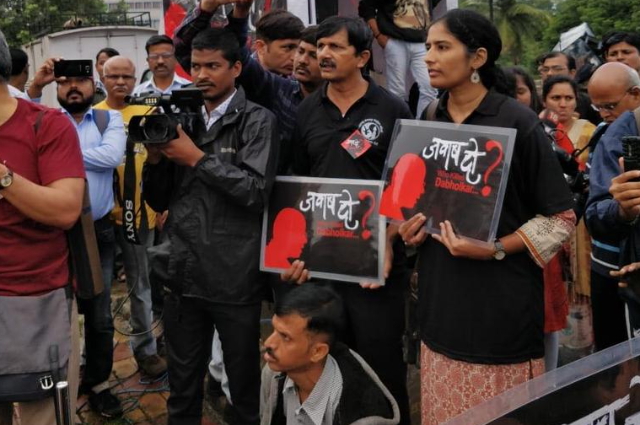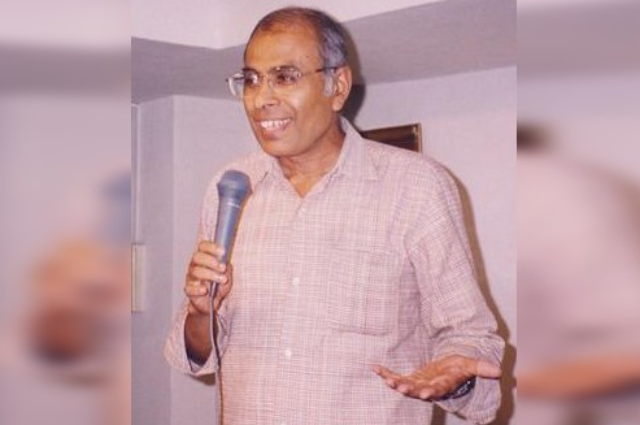More than a decade after the brutal assassination of renowned rationalist Dr. Narendra Dabholkar, his family continues to go for a legal battle that highlights the complexities of prosecuting ideologically motivated crimes in India. The recent appeal filed by Mukta Dabholkar, the activist's daughter before the Bombay High Court represents not just a family's quest for complete justice but a critical examination of how the judicial system handles cases involving larger conspiracies and terrorist activities.
Sessions Court Verdict: A Mixed Bag of Justice
Pune Sessions Court's verdict delivered on May 10, 2024, painted a picture of incomplete justice that has left the victim's family deeply unsatisfied. While the court did manage to secure life imprisonment sentences for the two shooters - Sachin Andure and Sharad Kalaskar, who were directly responsible for pulling the trigger and it simultaneously acquitted three other individuals who were allegedly integral to the broader conspiracy.
The three acquitted individuals include Virendra Singh Tawde, Sanjiv Punalekar, and Vikram Bhave who walked free despite being accused of the murder plot. More troubling for the Dabholkar family was the court's decision to acquit even the convicted shooters of serious charges including criminal conspiracy and terrorist activities under the stringent Unlawful Activities Prevention Act (UAPA). This selective application of justice has raised serious questions about the thoroughness of the prosecution and the court's interpretation of evidence.
Ideological Underpinnings: Sanatan Sanstha Connection
Central to Mukta Dabholkar's appeal is the allegation that the Sessions Court failed to adequately recognize and address the ideological motivation behind her father's assassination. According to the appeal, both the convicted and acquitted accused were members of the right-wing organization Sanatan Sanstha, a group that Dr. Dabholkar had consistently criticized in his work as a rationalist and social reformer.
The appeal argues that this was not merely a random act of violence but a calculated attempt to silence a prominent voice that challenged orthodox religious practices and superstitious beliefs. Dr. Dabholkar, as the founder of the Maharashtra Andhashraddha Nirmoolan Samiti (Committee for Eradication of Blind Faith), had made numerous enemies among fundamentalist groups through his campaign against superstition and blind faith.
The conspiracy as outlined in the appeal was specifically designed to eliminate Dr. Dabholkar because he was "expressing his views against the Sanatan Sanstha establishment, the Hindu Jan Jagaran Samiti and other similar organisations." This ideological dimension transforms the case from a simple murder to a broader attack on free speech and rational thinking in society.
Legal Technicalities and Systemic Failures
The appeal filed by Mukta Dabholkar highlights several critical legal and procedural issues that may have contributed to the partial acquittals. One of the primary concerns raised is the Sessions Court's finding that there was insufficient evidence to establish criminal conspiracy charges against the accused. This determination is particularly significant because proving conspiracy is essential for establishing the broader network of individuals responsible for planning and executing the assassination.
Furthermore, the court's decision regarding the applicability of UAPA provisions has come under scrutiny. The Sessions Court reportedly held that the UAPA section was not applicable due to invalid sanctions, a technical ruling that effectively removed some of the most serious charges from consideration. This aspect of the verdict is particularly concerning given that UAPA charges carry severe penalties and are specifically designed to address acts of terrorism and ideologically motivated violence.
The case also reveals procedural complexities, with different accused facing varying charges. While UAPA charges were leveled against only four of the five accused, Sanjiv Punalekar faced the unique charge of destruction of evidence, suggesting his role in covering up the crime after its commission.
High Court Proceedings and Path Forward
The matter came before a division bench of Justices Revati Mohite Dere and Prithviraj Chavan at the Bombay High Court for few days back, marking the beginning of what could be another lengthy legal process. The court has issued notices to both the Central Bureau of Investigation (CBI), which is the prosecuting agency in this case and all the accused parties, scheduling the next hearing for September 23.
This development places the spotlight on the CBI's handling of the investigation and prosecution. The central investigative agency will now need to defend its case and address the concerns raised by the victim's family regarding the incomplete nature of the convictions.
Broader Implications for Democratic Discourse
The Dabholkar case extends far beyond the specifics of one man's tragic death. It represents a litmus test for India's commitment to protecting those who challenge orthodox thinking and promote scientific temper. Dr. Narendra Dabholkar was not just any victim; he was a prominent advocate for rational thinking who dedicated his life to combating superstition and promoting scientific awareness among the masses.
His assassination on August 20, 2013, while he was taking his morning walk in Pune, sent shockwaves through the rationalist community and raised serious concerns about the safety of social reformers in India. The manner of his killing shot by two assailants in broad daylight had demonstrated the confidence of those who sought to silence dissenting voices.
Quest for Complete Justice
Mukta Dabholkar's appeal represents more than a daughter's desire for justice for her father's murder. It embodies the struggle to ensure that ideologically motivated crimes are prosecuted to their full extent with all conspirators held accountable for their roles. The partial nature of the Sessions Court verdict in convicting the shooters while acquitting the alleged masterminds creates a troubling precedent that could embolden similar attacks on rationalists, journalists, and social activists.
The family's persistence in challenging the acquittals demonstrates their commitment to ensuring that the complete truth emerges and that all those responsible for the conspiracy face appropriate legal consequences. Their fight continues not just for Dr. Dabholkar, but for the principle that in a democratic society where no one should fear for their life simply because they choose to question orthodox beliefs or challenge established religious practices.
As the case moves to the High Court, it will be closely watched by civil society organizations, rationalist groups and all those who believe in the fundamental right to free expression and scientific inquiry. The outcome will likely have far-reaching implications for how India addresses ideologically motivated violence and protects its most vulnerable voices of dissent.
. . .
References:


